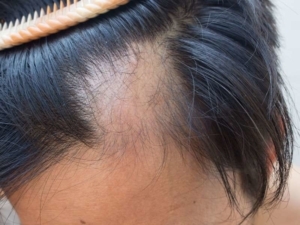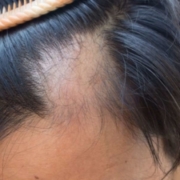What is Trichotillomania?
 Some of the most common bodily reactions to stress are teeth grinding or a sleepless night, but the most fascinating reaction is a hair loss disease called trichotillomania. People suffering from this disorder will literally pull their own hair out as a way to temporarily relieve stress. It sounds painful to others but to them it’s comforting. What causes trichotillomania and can someone be cured of it?
Some of the most common bodily reactions to stress are teeth grinding or a sleepless night, but the most fascinating reaction is a hair loss disease called trichotillomania. People suffering from this disorder will literally pull their own hair out as a way to temporarily relieve stress. It sounds painful to others but to them it’s comforting. What causes trichotillomania and can someone be cured of it?
A person suffering from Trichotillomania (TTM) will not be able to control the desire to pull their hair out. How do you know if you have this disorder? First, your hair loss will become noticeable. Secondly, you will feel intense anxiety before the act or when you try not to pull it out. Lastly, a sense of relief will overcome you after you’ve pulled out your hair. If no other disorder has been diagnosed and your hair pulling becomes disruptive to your daily routine you are suffering from trichotillomania.
No one cause of TTM has been determined but it typically falls into the category of an Obsessive Compulsive Disorder and it has been directly related to all types of stress. The most extreme complications of TTM are agoraphobia or the sufferer may take it to the next level and consume the hair they pull out. If they feel too much stress or shame about their condition they may stop leaving the house. When someone eats hair it can cause blockages in their digestive system and it can become a matter of life or death if they don’t have the hair surgically removed.
There isn’t an actual cure for TTM but those who seek treatment or therapy may be successful in overcoming the disorder. Medications like Prozac and other antidepressants have helped some patients reduce their stress levels and ultimately reduce the urge to pull hair. Cognitive Behavior Therapy is a technique that retrains the brain to avoid using hair pulling as coping mechanism. Hypnotism and other therapies have also worked for some patients. Other sufferers have found solace in support groups where they feel safe and can openly talk about their disorder.
Trichotillomania usually strikes during adolescence, but symptoms can occur at anytime in both men and women. It is more likely that a woman will suffer from TTM later in life while men typically show signs in early childhood and not as they get older.
Hair Loss Help in Tupelo
The important thing to remember is trichotillomania is a real disorder that can be treated and if you suffer from TTM do not be ashamed to ask for help. At North Mississippi Hair Loss Solutions in Tupelo, we help people suffering with Trichotillomania find a hair replacement solution that is right for them.
If you are looking to add volume to your hair or a full hair replacement system, we can accommodate your every need. To schedule a free visit here at North Mississippi Hair Loss Solutions, click here.
- Digital Detox for Your Mind & Scalp: Reclaiming Wellness from Inside Out - December 14, 2024
- October: Breast Cancer Awareness Month - October 3, 2024
- Effects of Chlorine on Thinning Hair - June 2, 2024





